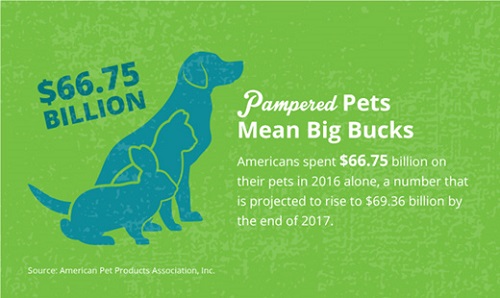How to Save Money While Welcoming a New Pet to Your Home

By Nathaniel Sillin
Whether it’s a dog, cat or another furry (or scaly) friend, many people have pets who are more than just animals ??? they’re part of the family.
Pets can be friends, they can offer nonjudgmental companionship when you’re feeling down and they can put a smile on your face. To provide the best care for a pet, you’ll want to be able to afford their needs, including the basics like food and healthcare. With this in mind, think carefully and review your budget before deciding to welcome an animal into your family.
??
Choose a pet that you can afford. While the initial cost of adopting or buying a pet is relatively small compared to the long-term expenses, the type of pet you choose does matter.
Admittedly, you might visit the pound and fall in love with a dog or cat. What can you do? The heart wants what the heart wants. Research is a must if you want to take cost-saving measures, though. For example, larger animal breeds may be more expensive to care for, partially because they simply eat more food. And if you’re taking in a dog you’ll want to consider the cost of training, which could set you back several hundred dollars.
Lifespan is another consideration. Hamsters, gerbils and some types of fish may only live a couple of years. A pet turtle, on the other hand, could live several decades.
Keep your pet healthy and happy. Health care can be one of the most expensive aspects of pet ownership. As with humans, it’s often best to invest in preventative care rather than treat emergencies.
Follow your pet’s recommended vaccination schedule and treatments, spay or neuter cats and dogs and visit the vet at least once a year for a checkup. Finding and dealing with health problems early on isn’t only less expensive, you may be able to prevent serious problems and improve your pet’s quality of life.
Some types of preventative care don’t require a visit to the vet, although you can still ask for recommendations. For example, brushing your dog’s teeth (with special toothpaste) can help prevent teeth and gum problems.
Consider pet insurance to cover emergencies. When a pet is part of the family, you’ll do anything to help him or her. You may want to have an insurance policy to help cover emergencies that you might not be able to afford otherwise. Particularly if you have a high-risk breed, a pet that tends to escape or you live in an area with a lot of other potentially aggressive animals.
Before buying a policy, read up on how pet insurance works. There can be important differences between pet and human policies.
Save money on nutritious food. Once you bring a pet home, it’s your responsibility to provide for them. You can ask your vet for food recommendations (and free samples) based on the pet’s type and age. The American Society for the Prevention of Cruelty to Animals has general nutrition tips for dogs and cats, including age-based diet recommendations.
Once you’ve found a food that you and your pet likes, you may be able to get a discount by signing up for a subscription delivery service online. Or, if you don’t mind the workout, consider buying in bulk at a warehouse club.
Have a plan for when you’re unavailable. Another responsibility pet owners take on is making sure their pet is looked after while they’re away. The least expensive option may be to find a neighbor or friend who also has a pet and exchange free pet-sitting services.
Otherwise, you can look for a well-reviewed doggy daycare center or boarding service. You could try one of the several apps that connect you with someone who can feed, walk or play with your pet. If you’re away for several days, the apps can also help you find someone who will spend the night or take your pet to their home.
Bottom line: Taking a pet into your home and caring for them can be a rewarding and wonderful experience. It can also be life changing. Review the potential immediate and long-term costs to help ensure that you’ll be able to provide for a pet once they join your family.
Nathaniel Sillin directs Visa’s financial education programs. To follow Practical Money Skills on Twitter: www.twitter.com/PracticalMoney
